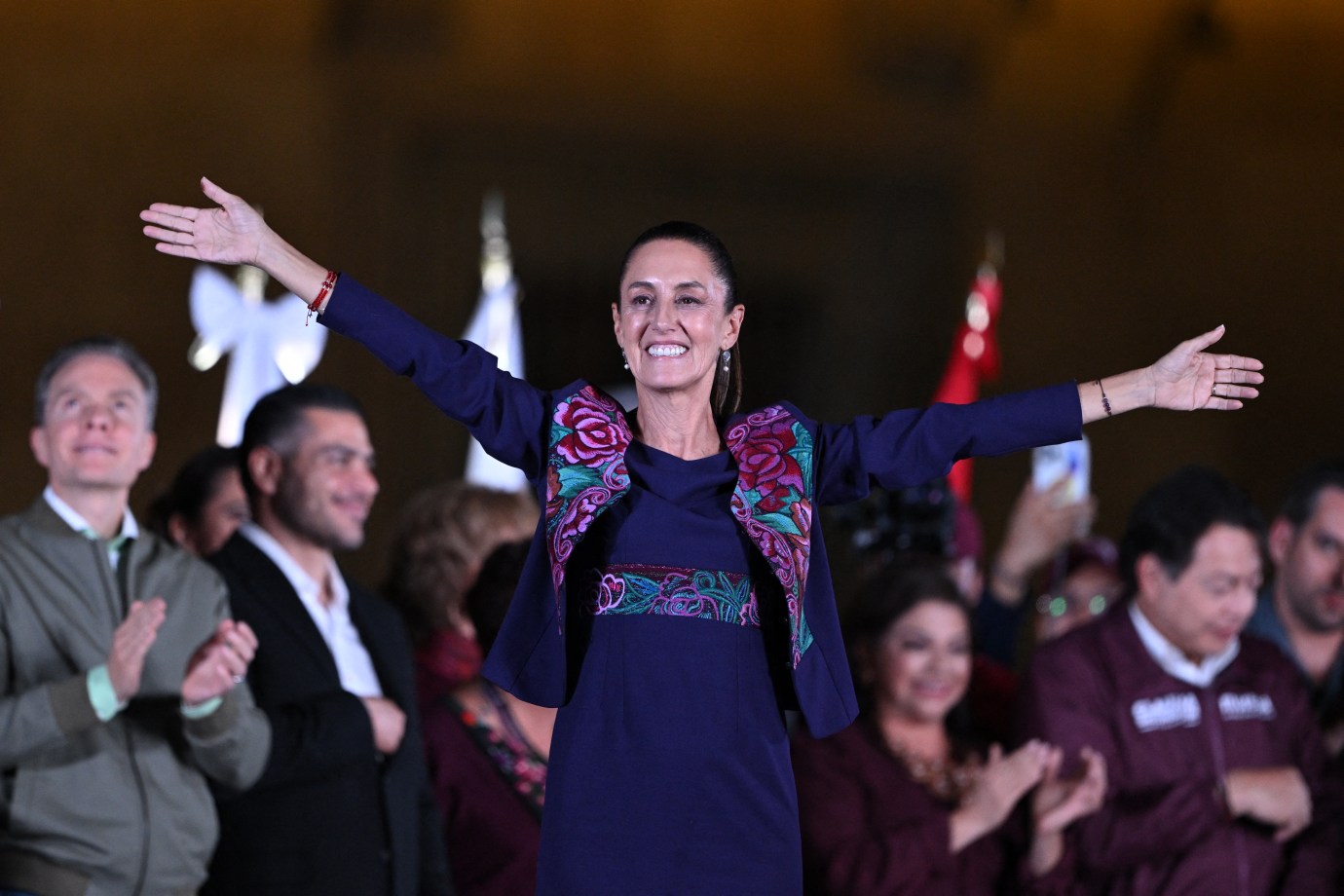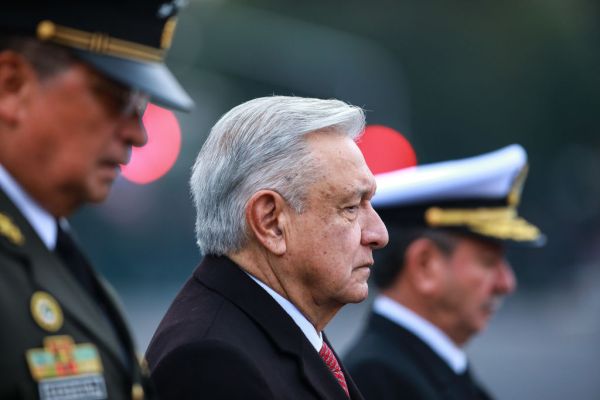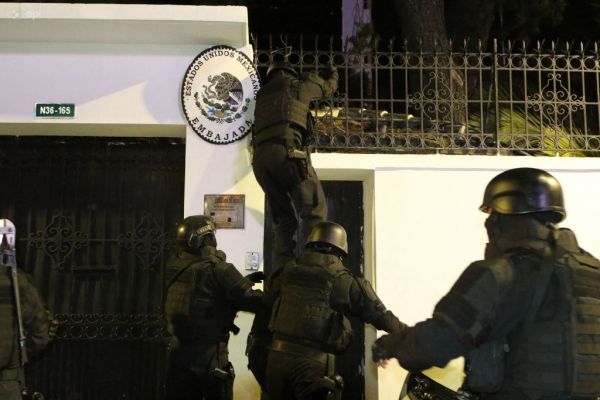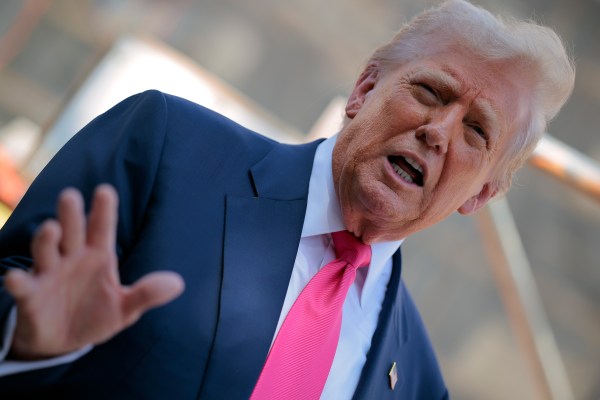Happy Tuesday! It’s officially summer here at The Dispatch: Our interns have begun to arrive, and the first softball game of the season was last night. It wasn’t quite the outcome we wanted, but fun was had by all—and Steve did hit a home run.
Quick Hits: Today’s Top Stories
- Democratic Sen. Robert Menendez of New Jersey, currently on trial after being indicted on corruption charges, filed for reelection on Monday as an independent, forgoing the Garden State’s Democratic primary. Federal prosecutors have alleged that Menendez and his wife engaged in a bribery scheme and acted as foreign agents for the Egyptian government. Rep. Andy Kim is the frontrunner in the Democratic primary for the seat as voters go to the polls today, but the race could become more volatile with Menendez’s entrance as an independent—possibly jeopardizing Democratic control of the seat.
- Former National Institute of Allergy and Infectious Diseases Director Anthony Fauci testified on Monday before a Republican-led House panel investigating the origins of the COVID-19 pandemic—the first time he’s testified in public since he left government in 2022. He said he has “an open mind” about the theory that the pandemic originated in a lab—though he still favors the theory that the virus emerged from animals—and distanced himself from the words of an adviser who suggested he use his personal email to conduct government business to avoid scrutiny. “Let me state for the record that to the best of my knowledge I have never conducted official business via my personal email,” he said.
- A jury was seated on Monday in the federal criminal trial of Hunter Biden, President Joe Biden’s son. The younger Biden is accused of illegally purchasing a gun while actively abusing cocaine. Opening statements are set to begin Tuesday, and the trial is expected to last one to two weeks.
- Federal prosecutors on Monday indicted Bill Guan, the chief financial officer at the far-right newspaper Epoch Times, on money laundering charges. The Justice Department alleges that Guan knowingly used cryptocurrency to purchase at a discount almost $70 million in crime proceeds—including from fraudulently obtained unemployment insurance benefits—that had been loaded onto prepaid debit cards to enrich himself and the company. Guan was arrested on Monday and charged with one count of money laundering and two counts of bank fraud.
- Democratic Rep. Sheila Jackson Lee of Texas—who’s served more than three decades in the U.S. House and ran unsuccessfully last year for mayor of Houston—announced Monday she has pancreatic cancer, but did not disclose her prognosis. “As I pursue my treatments, it is likely that I will be occasionally absent from Congress, but rest assured my office will continue to deliver the vital constituent services that you deserve and expect,” she said, addressing her constituents in a statement. She still plans to pursue reelection.
AMLO Passes the Baton

Women in Mexico weren’t granted the right to vote until 1953. But on Sunday—more than 70 years later—the country broke the highest glass ceiling there is, electing its first female president.
Claudia Sheinbaum—a leader in the Morena Party and the hand-picked successor of Mexico’s current president, Andrés Manuel López Obrador (AMLO)—won in a landslide victory. The vote is still being tallied, but official preliminary projections showed Sheinbaum defeating Xóchitl Gálvez, her main opponent, by more than 30 points. Gálvez conceded on Monday.
“For the first time in 200 years of the republic,” Sheinbaum said in her victory speech early Monday morning, “I will become the first woman president of Mexico.”
With AMLO’s Morena Party poised to potentially secure a supermajority in the Mexican Congress and inheriting a dire security situation, the question hanging over Sheinbaum’s presidency is how closely she plans to hew to her predecessor and mentor’s agenda—particularly on a controversial package of proposed constitutional reforms that critics argue will erode democratic norms and weaken checks and balances on the executive’s power.
Tens of millions of people turned out to vote Sunday to select some 20,000 government officials at the local, state, and federal levels in what was the largest election in Mexican history. “It’s an incredible experience to witness how much citizen participation there is in order to have these elections,” Lila Abed, acting director of the Mexico Institute at the Wilson Center, told TMD on election day. Abed served as an international electoral observer in Mexico City on Sunday, helping monitor election administration at polling stations.
Voters gave another stamp of approval for AMLO and Morena with Sheinbaum as the new standard bearer. The 61-year-old is the granddaughter of Jewish immigrants who fled Europe and a climate scientist by training. Along with being the first female president, she’s also the first Jewish person to hold the office.
Rival opposition parties, the National Action Party (PAN), the Institutional Revolutionary Party (PRI), and the Party of the Democratic Revolution (PRD), formed a loose coalition—dubbed Strength and Heart for Mexico—to challenge Sheinbaum and Morena. Gálvez, a former senator and businesswoman, led the opposition, running on a platform of restoring democratic checks and balances undermined by AMLO, combating violence, and reversing the growth of the military’s involvement in civilian life.
The race became a referendum on AMLO’s term-limited six years in power. “The decision is simple,” Sheinbaum said at a campaign event in April. “Do you want to continue the transformation started by President López Obrador, or do we want to return to a past of corruption and privileges?”
Voters seemed to agree with her framing of the stakes, carrying Sheinbaum and Morena to a decisive victory. Gálvez secured less than 30 percent of the vote, and Morena appears to have restored its supermajority—which it lost in the 2021 midterms—in the lower chamber of Congress. According to one projection, Sheinbaum’s party also came just a few seats short of such a supermajority in the Senate, although the final results have yet to be announced. That said, political analysts believe Morena could work with some of the minority parties in the Senate to secure the two-thirds majority vote required on votes to amend the country’s constitution.
From the very beginning, Sheinbaum’s political career has been closely tied to AMLO. She first entered public service in 2000, serving as the secretary of the environment for Mexico City when AMLO was mayor there. She left that post to work on AMLO’s 2006 presidential campaign and briefly served in the faux “legitimate government” that AMLO set up after he refused to accept defeat. Sheinbaum joined AMLO’s Morena Party after its inception in 2014 and eventually became mayor of Mexico City in 2018, before launching a bid for the Morena nomination for president last summer.
“I promise to protect López Obrador’s legacy,” she said at her final campaign rally last week.
What kind of legacy will Sheinbaum be stewarding? AMLO came into power promising a “Fourth Transformation” of Mexico—a government agenda he defined as on par with transformational events in Mexico’s history, such as Mexican independence from Spain in the early 19th century. Blending old-school leftist ideology with populism and a cult of personality, AMLO pushed the government in a more statist direction and away from what he described as a “neoliberal model” that he argued perpetuated corruption and social and economic inequality. He significantly expanded the government’s role in the energy sector, boosting state-owned enterprises over their private competitors, and initiated huge public works projects. He also reimagined Mexico’s social welfare system, raising the minimum wage and universalizing federal pensions. The social programs have been so popular that Gálvez ran on expanding some of them.
Less popular is the security situation in Mexico. “Under his administration, there’s been more than 180,000 homicides, the highest record of homicides,” Abed said. More than 30,000 people have been murdered each year since AMLO took office. Wary of previous bloody drug wars, AMLO instituted a security strategy of “hugs, not bullets,” focused on the root causes of crime rather than taking on criminal organizations and the cartels directly. He abolished the federal police—creating the National Guard in its place—and arrests plummeted.
The violence marred the election. At least 37 candidates—mostly at the state and local level—were assassinated this cycle, and at least 100 government officials and political activists have also been killed. “The ‘hugs, not bullets’ policy, what it means in practice is basically that the government just steps back and doesn’t contest territory anymore,” said Ryan Berg, director of the Americas program at the Center for Strategic and International Studies. “When you’ve got a vacuum, you’ve got an uncontested space, it’s going to be filled in—in this case, in many parts of the country, it’s been filled with local criminal organizations.”
While many Mexican women celebrated the historic occasion yesterday, Sheinbaum will lead a country where women face elevated levels of violence and insecurity: As of July 2023, 10 women and girls are killed every day, and the number of disappeared women has skyrocketed in recent years. Sheinbaum said she plans to implement policies to combat gender-based violence like creating an anti-femicide prosecutor’s office. But she’s also pledged to continue her mentor’s broader security strategy—and voters didn’t punish Morena at the ballot box for failing to stem the violence despite ranking it as a top concern in polls leading up to the election.
AMLO’s most enduring legacy could be his attempts to reshape Mexico’s political system. “AMLO has expanded the powers of the executive well beyond what the constitution mandates or allows,” Berg told TMD. A key pillar of that expansion has been the unconstitutional growth of the military’s role in previously civilian functions, from managing customs and building government bank branches, to running a commercial airline and constructing a massive tourist train line in the Yucatan peninsula that the army will control via a state-owned company.
Throughout his term, AMLO repeatedly attacked attempts to check his executive power from elsewhere in the government or civil society, including the judiciary, the press, and the National Electoral Institute (INE)—the independent public agency that organizes federal elections. “The Supreme Court has been the real check and balance to the executive branch, more so than Congress,” Abed, of the Wilson Center, told TMD. “It has really faced AMLO frontally and said, ‘You can’t do all of these things because they are unconstitutional.’”
But in February, the outgoing president released a series of proposed constitutional reforms designed to cement the executive and ruling party’s power. Chief among them: making Supreme Court justices (and all other judges and magistrates) directly elected as opposed to nominated by the president and confirmed by Congress. AMLO also pushed to make the leaders of the INE directly elected, reduce the number of lawmakers in both houses of Congress, put the military in full control of the National Guard, and abolish several independent government agencies and reconstitute them under the control of the executive.
“It could very much debilitate Mexico’s democratic institutions and separation of powers and checks and balances, which is fundamental for any democratic system,” Abed argued.
The timing of AMLO’s proposals wasn’t random. “The slew of reforms that AMLO put forward in February, he knew that they were dead in the water,” Berg said. “He knew that they weren’t going to go anywhere because Morena didn’t have the majority. But what they essentially serve as is a blueprint for [Sheinbaum’s] administration, should she get the numbers that she needs [in Congress].”
But a quirk in the timing of the presidential inauguration could enable AMLO to pass some of the reforms himself in the waning days of his presidency with the bolstered Morena power in the new Congress. “AMLO will have 30 days to engage with the new Congress from September 1 when it starts to October 1 when the new president takes office,” said Abed, who spoke to TMD before the projected results were in. “In that 30-day period, if he does have the two-thirds majority, he’s going to speed through all of [the proposals], trying to get as many of them approved.”
The outgoing president suggested yesterday that he’d defer to Sheinbaum on the bills. “We have to reach an agreement with Claudia on these bills,” he said. “I don’t want to impose anything.” The 70-year-old politician also reaffirmed his intention to fully retire from public life at the end of his term.
Beyond domestic policy, it’s unclear how Sheinbaum will approach foreign affairs. AMLO cared little for international issues, insisting “the best foreign policy is a good domestic policy.” The incoming president said little about her foreign policy goals during the campaign, but relations with Mexico’s neighbor to the north will no doubt be a central priority.
Chris Landau, the U.S. ambassador to Mexico from 2019 to 2021, told TMD on Sunday that he didn’t expect anything fundamental to shift about U.S.-Mexico relations if Sheinbaum won. The X factor, he argued, would be who wins the U.S. presidential election in November. “If President Trump is reelected, I think he’s going to be much more anxious for Mexico to take a much more proactive role on the border and on security issues than it has, and is not going to be shy about using all the levers the United States has to do that.” While president, Trump threatened tariffs on Mexican imports in 2019 to secure cooperation on slowing the flow of migrants to the U.S. southern border.
The United States-Mexico-Canada Agreement (USCMA), the trade pact that replaced the North American Free Trade Agreement, is due for review in 2026, and Mexico’s growing economic relationship with China could potentially threaten the agreement. “There’s a very good chance, especially if Trump is president, that the USMCA will not be renewed,” Landau argued. “The Mexicans are putting their entire economy at risk if they are welcoming Chinese investment.”
But Mexico’s immediate future will depend on how much room and or desire Sheinbaum has to differentiate herself from her mentor. “Striking that balance of making a mark of her own, but making sure that she’s loyal and keeps to her word in terms of continuing AMLO’s government’s policies,” Abed said. “That’s going to be the really hard and challenging work that she will have ahead.”
Worth Your Time
- Free-market economics has been a central tenet of American conservatism for decades, David McGarry argued in National Review, but a growing faction of the political right is being drawn to centrally planned, free-market alternatives to public policy. “The anti-market Right embraces protectionism, industrial subsidies, and closely regulated markets, as well as zealous antitrust enforcement,” he argued. “This ideology also embraces labor unions and radical progressives who share a taste for command-and-control, crossing once-firm ideological borders. Some who once praised efforts to ‘constrain political actors from ad hoc adventures in feckless dirigisme’ now promise explicitly ‘to wield political power to reward friends and punish enemies.’ … A reactionary reversion to illiberalism and extinct economic models is as impossible as it is undesirable. It is, moreover, somewhat humorous, considering their mistrust of foreign goods, foreign investment, and foreign labor, that statist conservatives have eagerly imported European-style political and economic philosophies that, acid-like, erode the bedrock principles of the American founding.”
- As the 80th anniversary of D-Day approaches, Garrett M. Graff, writing for Politico Magazine, told the story of U.S. Army Cpl. Waverly Woodson, a nearly forgotten hero of that fateful day. “Woodson, all of 21 years old and part of the only Black combat unit to land on D-Day, found himself amid almost unspeakable carnage,” Graves wrote. “He’d stay there on the sandy and rocky beach, treating the wounded, for the next 30 hours, working through the day, the night, and nearly all of the next day—all while trying to treat his own shrapnel injuries to his groin and back—before he was evacuated himself. … His record of valor that day became a casualty of entrenched racism, wartime bureaucracy, and Pentagon record-keeping. In fact, his story was all but forgotten—except by his family—for more than a half-century. … But, in a surprise Monday morning, provided exclusively in advance to POLITICO Magazine, the Pentagon and Sen. Chris Van Hollen (D-Md.) announced that Woodson will receive the Distinguished Service Cross, the nation’s second-highest medal for combat valor—as part of a long overdue recent reckoning by the military about how institutional racism suppressed awards for heroic Black soldiers in World War II.”
Presented Without Comment
Variety: Elon Musk’s X Now Officially Allows Porn After Update to Policies
Also Presented Without Comment
The Hill: Trump Attorney: Melania [Trump’s] Absence at Husband’s Trial Not for ‘Lack of Love and Support’
Also Also Presented Without Comment
Mediaite: RFK Jr.’s Running Mate Says She and Tucker Carlson Are ‘So On the Same Page In Every Single Way’
In the Zeitgeist
Maggie Rogers’ new album, Don’t Forget Me, may be—in your Morning Dispatchers’ humble opinions—one of the greatest of the year so far. It’s been a wild ride for the pop artist since she was discovered by Pharrell in 2016 during a masterclass at music school, but she’s not just innovative and cool—she can also sing the classics like a pro:
Toeing the Company Line
- It’s Tuesday, which means Dispatch Live (🔒) returns tonight! Sarah and the team will discuss the news of the week and, of course, take plenty of viewer questions! Keep an eye out for an email later today with information on how to tune in.
- In the newsletters: Kevin argued (🔒) that, for all its faults, Alvin Bragg’s case against Trump successfully showed us what kind of man Donald Trump is, the Dispatch Politics crew talked to former Nikki Haley campaign staffers about Haley’s Trump endorsement, and Nick explored (🔒) what Trump, the GOP, and voters might have learned from Trump’s conviction.
- On the podcasts: Sarah and David wonder on Advisory Opinions whether Biden will pardon his son as Hunter’s criminal trial kicks off.
- On the site: Kevin argues that Trump and the Chinese government are a lot alike, and Chris reflects on Adam Smith’s Theory of Moral Sentiments from Smith’s hometown of Edinburgh, Scotland.
Let Us Know
What should the U.S.-Mexico relationship look like—should it be that of allies, or more adversarial?











Please note that we at The Dispatch hold ourselves, our work, and our commenters to a higher standard than other places on the internet. We welcome comments that foster genuine debate or discussion—including comments critical of us or our work—but responses that include ad hominem attacks on fellow Dispatch members or are intended to stoke fear and anger may be moderated.
With your membership, you only have the ability to comment on The Morning Dispatch articles. Consider upgrading to join the conversation everywhere.